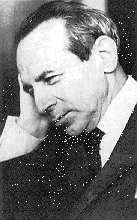| Profile | Major Works | Resources |
Michal Kalecki, 1899-1970.

In his lifetime, Polish economist Michal Kalecki was one of the unsung heroes of macroeconomics - and a potent lesson in why, in economics, one should always publish in English. Although Kalecki claimed to have anticipated much of the principles stated in Keynes's General Theory, his articles (1933, 1935) were published in Polish and French and thus went unrecognized. Attempting to rectify this, Kalecki decided to publish a claim of precedence to Keynes in a 1936 article... but in Polish again!
Kalecki's work in English, notably on business cycles (1935, 1937, 1939, 1943, 1954) introduced him in his own stead and was notable in its advancement of the use of mathematical dynamics in economics. His work also incorporated several Classical and Marxian concepts, relying to a good extent on "class conflict", income distribution and imperfect competition - items which would inspire the Cambridge Keynesians - particularly Robinson, Kaldor and Goodwin - as well as modern "American" Post Keynesian economics (e.g. Harris, Steindl).
Kalecki worked at the Institute of Business Cycles and Prices in Warsaw for much of the early part of his life. In 1937, while Kalecki was spending a year abroad, part of it at Cambridge, his old supervisor in Warsaw was fired, and Kalecki resigned in protest, and extended his stay in England. Probably just in the nick of time - as, given his Jewish heritage and socialist leanings, Kalecki was unlikely to survive for long in Nazi-occupied Poland. Needing a new perch, in 1940, Kalecki was hired by the newly-created Oxford Institute for Statistics, where he remained throughout the war. Resigning from Oxford in 1945, Kalecki spent a couple of years roaming around, before finally joining the UN Secretariat in New York in 1947. Disenchanted by the tide of McCarthyism in the US, Kalecki resigned in 1955 and returned to (now communist) Poland, resuming his position at the considerably-transformed Warsaw Institute.
|
Major Works of Michal Kalecki
|
HET
|
|
Resources on Michal Kalecki
|
All rights reserved, Gonšalo L. Fonseca
